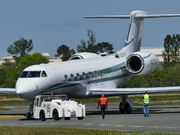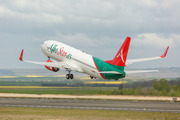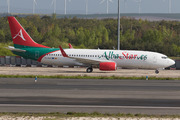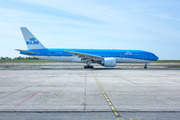Dépêches
Fitch Affirms Augusta, GA's Airport Revs at 'BBB-'; Revises Outlook to Negative
Dépèche transmise le 25 mars 2009 par Business Wire
NEW YORK--(BUSINESS WIRE)--Fitch Ratings affirms the 'BBB-' rating on Augusta, Georgia's $13.4 million of outstanding passenger facility charge (PFC) and general revenue bonds (series 2005 A/B bonds). In addition, Fitch affirms the 'BBB-' rating on $6.2 million of outstanding general revenue bonds (series 2005 C bonds). The series 2005 A/B bonds are secured by a first priority pledge of and lien on PFC revenues and net general revenues of Augusta Regional Airport (the airport). The series 2005 C bonds are secured by a first priority pledge of and lien on the airport's net general revenues only.
The Rating Outlook on all bonds is revised to Negative from Stable. The airport has demonstrated historic profitability in its fueling business over a range of economic cycles, and the airport has proposed an $8.8 million contribution from unspent construction proceeds to pre-fund the sinking fund accounts for the series 2005 bonds. However, the Negative Outlook is based on the expectation of future credit pressures for the airport over the medium term as a result of declining demand and margins for aviation fuel, particularly from the airport's large, historically price inelastic general aviation traffic base. The Outlook also assumes the continuation of scheduled commercial service by Atlantic Southeast Airlines and U.S. Airways Express since the airport needs to continue to utilize PFC revenues to offset a portion of the series 2005 A/B debt service. Should the airport's efforts to generate additional non-airline revenue and improve gross margins on fuel sales fail, a negative rating action is likely.
The 'BBB-' rating reflects:
--The airport's profitable historical financial performance in the fueling business as a result of the inelasticity of fuel demand from the airport's general aviation traffic base and the visibility accorded to the Professional Golfers' Association's annual Master's Tournament;
--The airport's uninterrupted history of scheduled commercial service and the origination and destination profile of its passenger traffic support a minimum level of demand;
--The non-critical nature of the airport's future capital projects which are not expected to be debt financed.
In addition, the rating also reflects the airport's proposed $8.8 million deposit to the sinking fund accounts for the series 2005 bonds in fiscal 2009 along with acceptable backstop liquidity through the existing bond security package and the airport's unrestricted cash balances.
Credit concerns include:
--The airport's high degree of dependence on fuel sales and PFC revenues as the primary sources of repayment;
--The gross margin compression experienced in the airport's fueling business over the past several years with residual exposure to future declines in demand for aviation fuel in a recessionary U.S. economic environment;
--Significant market share concentration in Atlantic Southeast Airlines and U.S. Airways Express, which creates a lack of predictability in PFC collections and overall levels of traffic due to variations in airline pricing policies and routing/service pattern decisions, while increasing exposure to bankruptcy risk;
--Limited scope for the re-introduction for mainline commercial service based on the airport's proximity to Hartfield-Jackson Atlanta International airport;
--The fact that a large portion of the airport's profits from its fueling business is linked to the annual Master's Tournament in April of each year, which creates seasonality in the airport's cash flow profile while exposing it to a degree of event risk.
With the majority of operating revenues coming from non-airline sources, in particular fuel sales (70% of operating revenues), the stability of the airport's financial profile and its ability to service outstanding debt obligations is inextricably linked to the health of its wholly-owned fueling operation. When Fitch originally rated the bonds the airport's gross margin from fuel sales stood at 38%, but increasing fuel expenses and elasticity have compressed gross margins over the past several years, currently standing at 27%. However, the airport's policy of adjusting fuel prices on a weekly basis to reflect increased costs of supply and prevailing market rates provides a degree of protection against further material erosions in gross margins from the fueling business. Gallon fuel sales from the airport's general aviation segment declined by approximately 12% in 2008, with further declines of 20% anticipated through 2009/2010, reflecting lower demand as a result of the recessionary economic environment in the U.S.
Airline activity continues to represent a fairly minor piece of the airport's overall business and financial profile. Nonetheless, PFC collections are an important source of revenue as the series 2005 A/B bonds are payable firstly from PFCs. Pricing policies and routing/service pattern adjustments by the Airport's primary air carriers have resulted in fluctuating levels of enplanements (and PFC collections) over the past several years, putting additional pressure on the profitability of the airport's fueling business to support ongoing operations and meet bond debt service.
Based upon the airport's proximity to Hartsfield-Jackson Atlanta International Airport, the prospect for increased or new commercial carrier service at the airport is extremely limited. However, the airport's uninterrupted history of scheduled commercial service and the origination and destination nature of the airport's traffic support a base level of demand. Atlantic Southeast Airlines, the airport's largest carrier (57% of enplanements for 2008) appears committed to continuing its long-standing presence in the market, and U.S. Airways Express, the airport's only other scheduled air carrier, has grown significantly over the past several years, now accounting for approximately 40% of enplanements.
Construction of the airport's new terminal began in 2005 and the date of beneficial occupancy was achieved on Dec. 9, 2007, with final demolition ending in February 2008 and final project completion achieved in July 2008. The total overall cost of the terminal project was $30 million, including construction services and program management. The terminal project was completed on time and within budget. The airport was able to secure federal and state grant funding for the terminal project significantly in excess of original projections. Airport management has advised that $8.8 million in remaining construction fund proceeds after successful completion of the new terminal will be deposited into the sinking fund accounts for the series 2005 bonds during fiscal 2009 ($7 million allocated to series 2005 A/B bonds and $1.8 million allocated to series 2005 C bonds). These funds should provide strong additional levels of funded liquidity to the series 2005 bonds, while being backstopped by the existing cash reserves which comprise the bond security package.
Fitch's rating definitions and the terms of use of such ratings are available on the agency's public site, www.fitchratings.com. Published ratings, criteria and methodologies are available from this site, at all times. Fitch's code of conduct, confidentiality, conflicts of interest, affiliate firewall, compliance and other relevant policies and procedures are also available from the 'Code of Conduct' section of this site.
- 24/04Ibis Styles London Heathrow : l'hôtel géré par un passionné d'aviation pour les passionnés d'aviation (photos + vidéos)
- 23/04 SkyUp renouvelle son partenariat avec Wizz Air
- 23/04 Play : résultats de mars 2024
- 23/04 Les garde-côtes japonais commande trois Airbus H225 supplémentaires
- 23/04 Vueling et Make-A-Wish France signent un partenariat
- 23/04 TUI annonce ses destinations au départ de Deauville pour l'été 2024.
- 23/04 Twin Jet renforce son programme de vols sur la ligne Toulouse/Rennes
- 23/04 Norse Atlantic Airways : résultats du mois de mars 2024
- 23/04 Volotea renforce son offre entre Lille et le Maroc
- 22/04 Finnair a dévoilé son programme de vol pour les saisons hiver 2024 et été 2025
- 22/04 Qatar Airways annonce le lancement de vols à destination de Kinshasa
- 22/04 Vietnam Airlines et CAE prolongent leur accord
- 22/04 Mermoz Academy de Tours commande des Tecnam P-Mentor
- 22/04 Transavia France reçoit son 2e Airbus A320neo
- 20/04 Friedrichshafen 2024 : Blackwing présente un nouveau modèle de son BW650RG
- 20/04 Friedrichshafen 2024 : JMB Aircraft présente son Phoenix
- 19/04 Friedrichshafen 2024 : le projet "Fly To The North"
- 19/04 Friedrichshafen 2024 : Aura Aero présente pour la première fois ses trois appareils
- 19/04 Friedrichshafen 2024 : Duc Hélices présente son hélice Tiger-3
- 19/04 Friedrichshafen 2024 : Splash-in Aviation expose son Pétrel X







